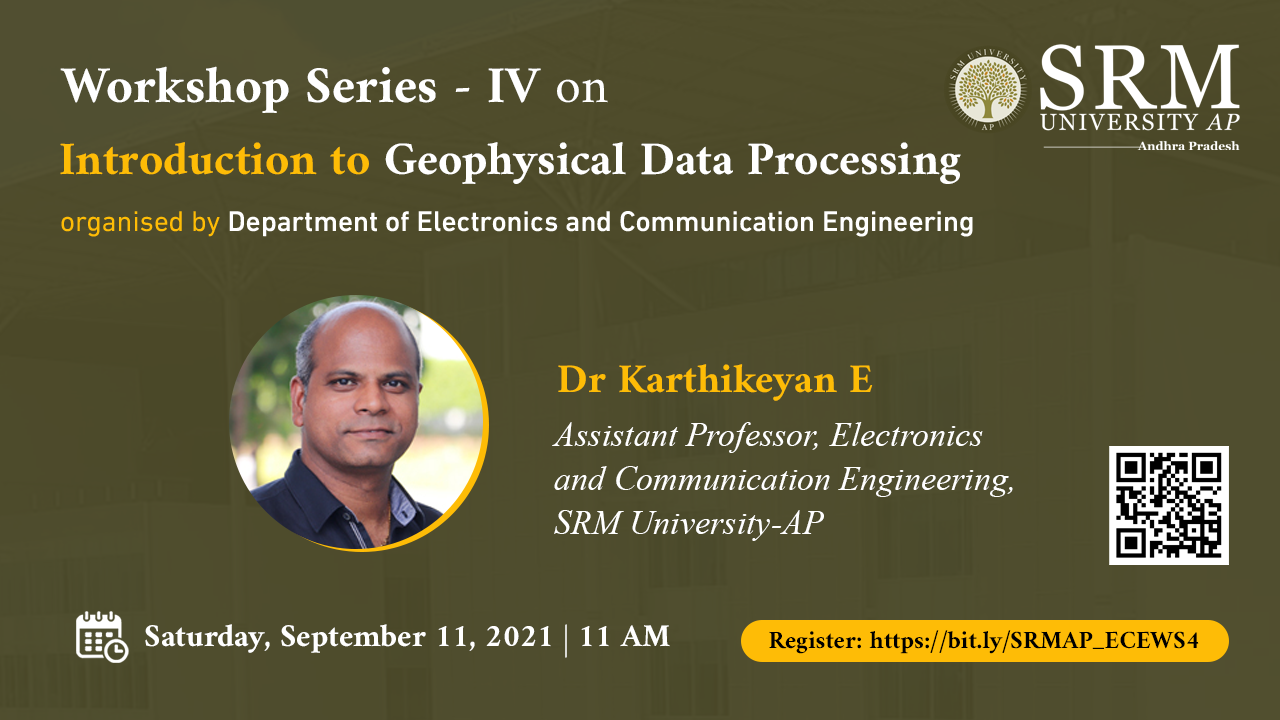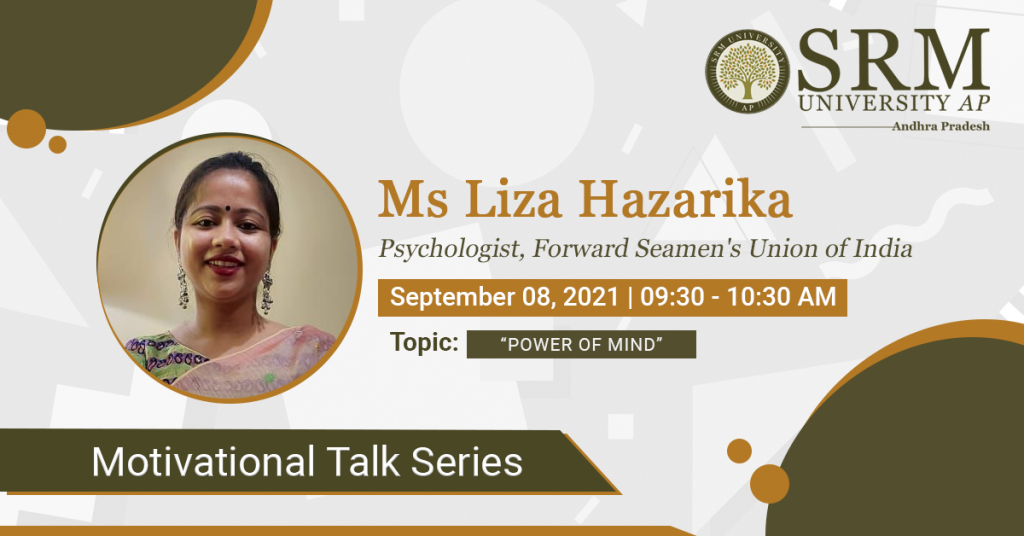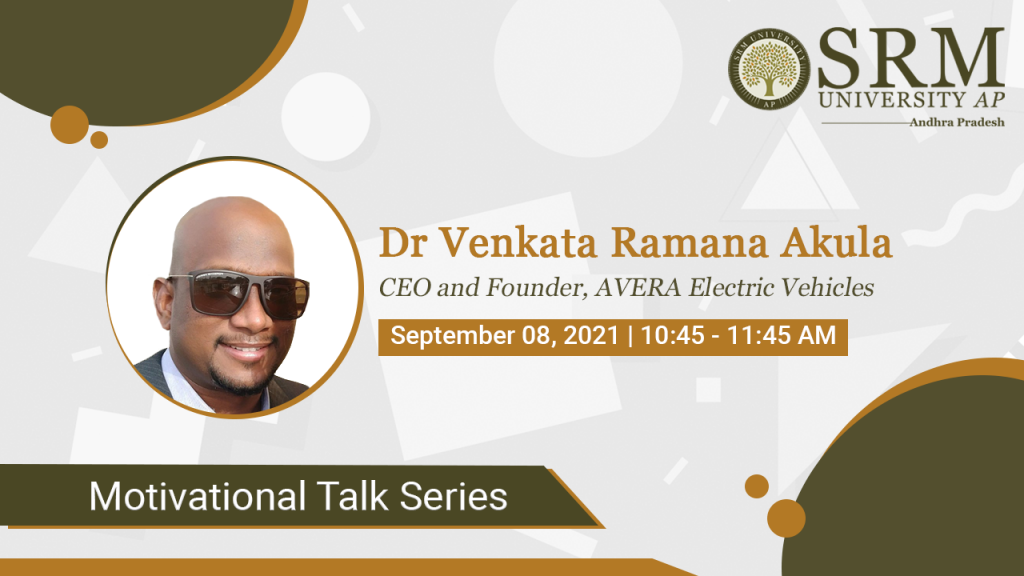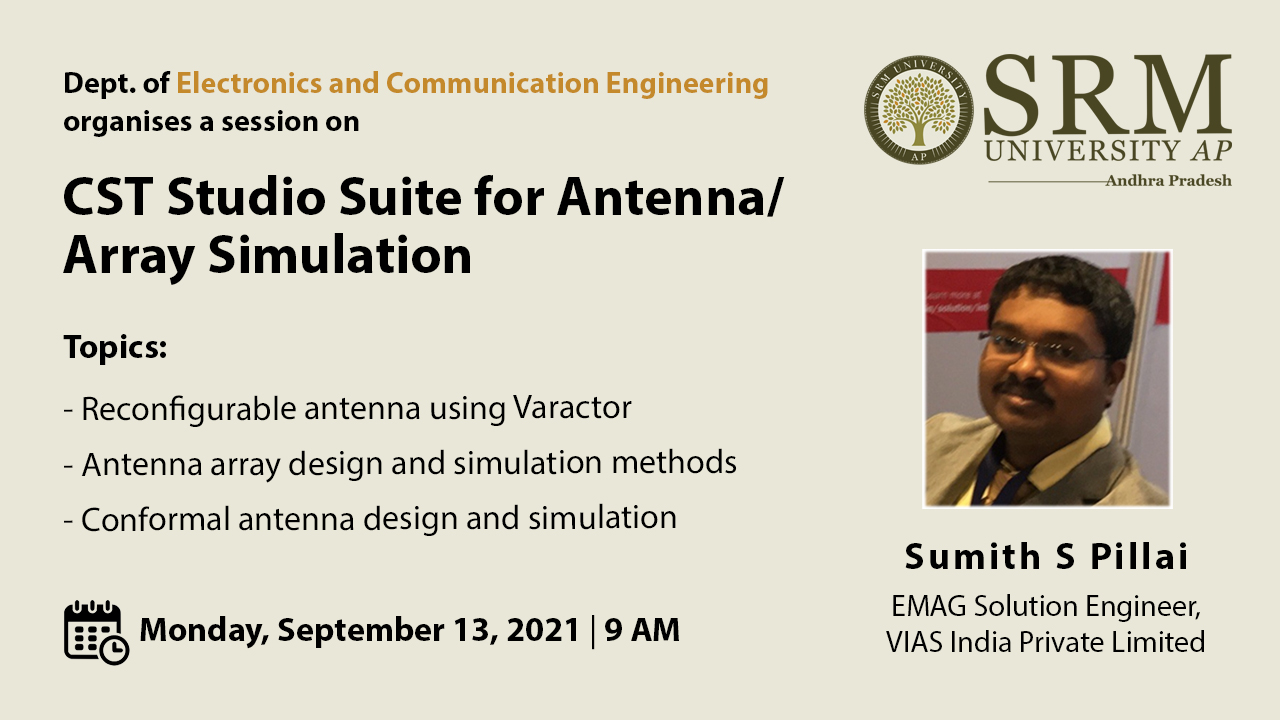A session to explore novel areas of research
 The Department of Mathematics at SRM University-AP is organising a webinar session on the topic “On non-vanishing of modular L-functions inside the critical strip” on September 08, 2021, at 3:30 pm. Mr E. M Sandeep, a senior researcher from the Kerala School of Mathematics will be the guest speaker at the event. All interested students and faculty are invited to join the session and gain insightful thoughts from the expert scholar.
The Department of Mathematics at SRM University-AP is organising a webinar session on the topic “On non-vanishing of modular L-functions inside the critical strip” on September 08, 2021, at 3:30 pm. Mr E. M Sandeep, a senior researcher from the Kerala School of Mathematics will be the guest speaker at the event. All interested students and faculty are invited to join the session and gain insightful thoughts from the expert scholar.
For more information, please go through the abstract provided on the left. Link to join the session
- Published in Departmental Events, Events, Math Events
Introduction to Geophysical Data Processing
 The fourth edition of the ongoing Workshop series “Learn & Earn: Hands-On Science & Technology (HOST)” organised by the Department of Electronics and Communication Engineering (ECE) at SRM University-AP is scheduled to be held on September 11, 2021, at 11.00 am. The workshop series-IV titled “Introduction to Geophysical Data Processing” will be engaged by Dr Karthikeyan Elumalai, Assistant Professor in the department.
The fourth edition of the ongoing Workshop series “Learn & Earn: Hands-On Science & Technology (HOST)” organised by the Department of Electronics and Communication Engineering (ECE) at SRM University-AP is scheduled to be held on September 11, 2021, at 11.00 am. The workshop series-IV titled “Introduction to Geophysical Data Processing” will be engaged by Dr Karthikeyan Elumalai, Assistant Professor in the department.
Between measuring geophysical data and charting it, there is a stage called data processing. Some measurement inaccuracies can be addressed during this process. Various aspects of the data can also be extracted. In a geophysical map, for example, large or small patterns might be emphasised, and anomalies that extend in one direction can be enhanced or muted. The workshop aims to learn and explore the latest techniques in the field of Geophysical Data Processing.
About the Speaker:
Dr Karthikeyan Elumalai received his BE and ME degrees from Anna University, Chennai in 2007 and 2009 respectively. He completed his PhD degree from the Indian Institute of Technology Delhi (IIT-D) in 2018. He is working as an Assistant Professor in the Department of ECE, SRM University-AP. He has also received a research grant from the Department of Science and Technology (DST), India. His research interests include seismic signal processing, seismic modelling and inversion, and machine learning.
Join this informative session on September 11, 2021, at 11.00 am to know more about Geophysical Data Processing and its thrust areas.
Register here: https://srmap.zoom.us/webinar/register/WN_tfnal7QcRCGX3eErWLgihg
- Published in Departmental Events, ECE Events, Events, Workshop
Liza Hazarika to usher in the Powers of Mind
 Ms Liza Hazarika is joining the Freshmen Orientation Programme-2021 on September 08, 2021, at 9.30 am to deliver an interesting talk on “Power of Mind”.
Ms Liza Hazarika is joining the Freshmen Orientation Programme-2021 on September 08, 2021, at 9.30 am to deliver an interesting talk on “Power of Mind”.
Ms Liza Hazarika is currently working as a psychologist with Forward Seamen’s Union of India and is also associated with Pratishruti Cancer and Palliative Trust as a volunteer and psychologist.
Ms Hazarika is a certified Spiritual therapist from Amrit Asmi Institute. She believes in a holistic approach to treatment. She is the founder of Call For Healing, a space for spiritual practices. Ms Hazarika is also actively involved in several Non-Governmental Organizations working in areas of mental health. She has done her Master’s in Clinical psychology and Bachelor’s in Psychology from Handique Girl’s College, Guwahati.
Join her on September 08, 2021, at 9.30 am to learn to unleash the powers of the mind.
- Published in Events, Students Affairs Events
In conversation with Dr Venkata Ramana Akula
 The Freshmen Orientation Programme 2021 brings another exciting session with Dr Venkata Ramana Akula, Founder & CEO, AVERA, on September 08, 2021, at 10.45 am.
The Freshmen Orientation Programme 2021 brings another exciting session with Dr Venkata Ramana Akula, Founder & CEO, AVERA, on September 08, 2021, at 10.45 am.
Dr Ramana AVE, an innovative and performance-driven entrepreneur with a deep passion for technology and business, led the development of India’s first largest electric scooter manufacturing unit AVERA at Vijayawada, Andhra Pradesh. Being the Founder & Chief Executive officer for AVERA, he is experienced in managing all aspects of business development, including quality, product development and identifying new segments with growth opportunities. Dr Ramana was the man behind the inception of India’s first high-speed electric scooter RETROSA. An accomplished businessman with excellent leadership skills, Dr Ramana, is known for delivering substantial revenue and profits gained in a highly competitive market.
Join the session to interact with the entrepreneur on September 08, 2021, at 10.45 am to learn more about business ventures and ideas.
- Published in Events, Students Affairs Events
Industry expert to usher students into Antenna/Array Simulation
 Department of Electronics and Communication Engineering is organising a session on “CST Studio Suite for Antenna/Array Simulation” on September 13, 2021, at 09:00 am. Mr Sumith Pillai from VIAS India private limited will deliver the keynote address and enlighten the students on-
Department of Electronics and Communication Engineering is organising a session on “CST Studio Suite for Antenna/Array Simulation” on September 13, 2021, at 09:00 am. Mr Sumith Pillai from VIAS India private limited will deliver the keynote address and enlighten the students on-
- Reconfigurable antenna using Varactor
- Antenna array design and simulation methods
- Conformal antenna design and simulation
About the Speaker:
Mr Sumith Pillai is working as an EMAG Solution Engineer at VIAS3D India. He has more than 10 years of experience in the RF & Microwave domain. He is responsible for managing support and technical activities for various Industries and Academic Institutions across India and the USA. Mr Pillai has expertise in the Design and Analysis of Antenna, Array and Radome. He is further experienced in Antenna placement, RCS optimisation and EMI-EMC.
No wonder this will be a fascinating session for ECE students to be able to communicate with a person experienced in real-life industry applications of RF and Microwave. For further details, please get in touch with Dr Divya Chaturvedi and Dr Goutam Rana, Assistant Professors at the Department of Electronics and Communication Engineering. Be a part of the exciting session on September 13, 2021, at 09:00 am.
- Published in Departmental Events, ECE Events, Events

